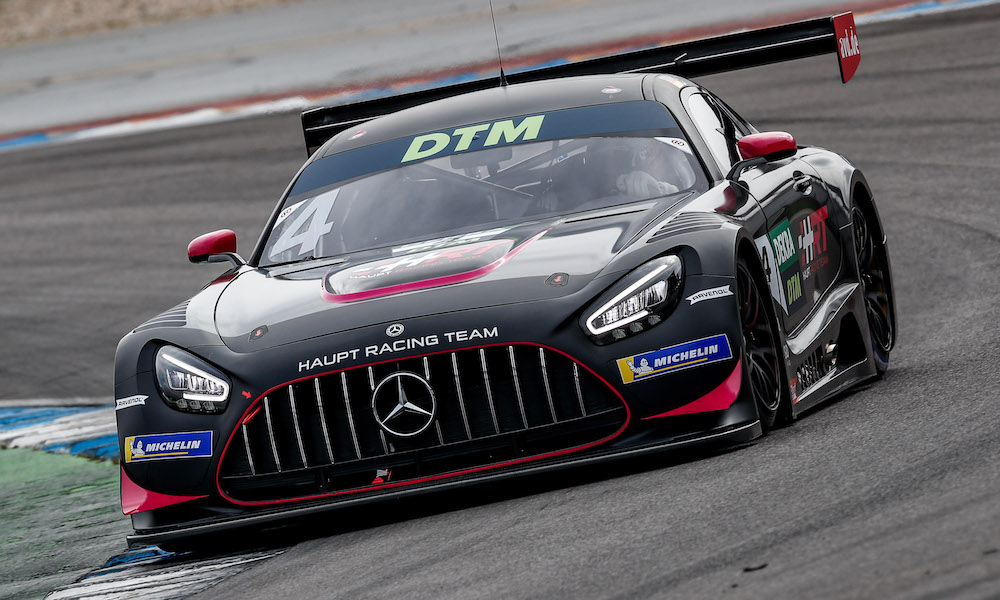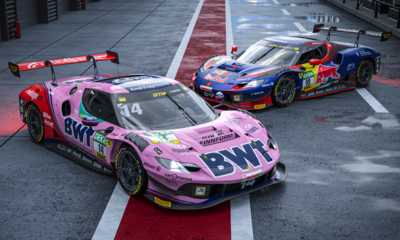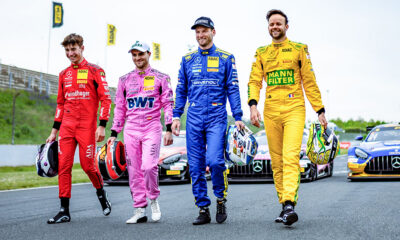Haupt Racing Team’s Mercedes-AMG GT3 Evos led the opening day of testing for the DTM’s new GT3 era at Hockenheim as snowy conditions limited the afternoon running.
Four two-hour sessions were planned for Wednesday, with the back-to-back opening pair and the first segment after lunch all going forward. Intensifying snowfall prompted a delay to the last session while only one car joined the track after the resumption.
DTM returnee Maximilian Goetz came away with the fastest lap of the opening day and was backed up by his HRT teammate Vincent Abril who finished second overall.
Goetz turned in a time of 1:36.590 to go just under two-tenths of a second quicker than Abril in session two before the lunch break.
The fastest driver from the opening session, Kelvin van der Linde, ended up third-quickest at the end of the day with his Abt Sportsline Audi R8 LMS GT3 Evo.
The South African produced a 1:36.867 lap time to go marginally in front of FIA Formula 2 race winner and sports car racing rookie Liam Lawson, whose best input was a session two 1:36.897 aboard the Red Bull AF Corse Ferrari 488 GT3 Evo 2020.
Goetz, Abril and Lawson reached the top five in each of the three sessions held.
Lawson’s AF Corse counterpart Alex Albon, driving the Alpha Tauri Ferrari, came through in sixth behind Team Rosberg Audi ace Nico Mueller.
2020 DTM runner-up Mueller produced a time of 1:36.945 to lead the third session and rank fifth outright, while ex-Formula 1 driver Albon posted a 1:37.091 in session two.
The highest-placed BMW driver was double series champion Marco Wittmann who finished seventh on a 1:37.260 behind the wheel of Walkenhorst Motorsport’s M6 GT3.
ROWE Racing BMW pilot Sheldon van der Linde was eighth, ahead of Muecke Motorsport’s Gary Paffett and GetSpeed Performance’s Arjun Maini in Mercedes-AMGs.
Wednesday’s running marked the DTM’s first official track action with FIA GT3 cars, along with the introduction of Michelin’s Pilot Sport GT S9M tire to the championship.
This week’s test involves the gathering of real-world data to compare with simulated car models that have been created for the series’ new Balance of Performance system.
The DTM is working with Austrian company AVL to roll out a BoP that will manage car performance through simulations rather than physical powertrain and wind tunnel tests.
“We have a lot of first-timers and combinations of first-timers: excellent drivers sitting in excellent cars with excellent teams,” said Michael Resl, the competition and technology director of DTM series organizer ITR.
“The initial objective is to have a platform for all the new people. We have introduced a new tire from our new partner Michelin, so this has to be tested and adapted to our vehicles.
“Also we have to check system functionalities, data acquisition. And we are gathering vehicle data to refine our virtual models that we built from the dynamic and static templates.
“Every car is virtually built from scratch. Now we are matching it with the real-world data that we acquire here in testing.
“Out of this, we simulate and predict the virtual car behavior and check if the simulation model does the same thing as the car in the real world. Once we meet our matching key performance indicators, we are happy that the virtual model is OK for all different cars.”
A total of 15 cars and 17 drivers appeared on track during the first day of testing, while some BMW M4 GT4s from the DTM Trophy joined in for sessions one and three.
Of note, reigning Total 24 Hours of Spa and Nürburgring 24 winner ROWE Racing has only brought one of its two BMWs while Abt Sportsline ran two of its three Audi entries.
“We thought one car would be fine,” said ROWE team principal Hans-Peter Naundorf. “There was no plan to run with two cars for both of the tests [at Hockenheim and Lausitzring].
“The first time we’re going to be hitting the track with two cars will be the first race in Monza.”
JP Motorsport’s McLaren 720S GT3, which is running select races with Christian Klien, is not at Hockenheim. The Polish squad received its new car at the start of this week.
Eight hours of testing is planned for Thursday, with the first session due to start at 9 a.m. local time (3 a.m. EST).
RESULTS: Day One (combined)


























